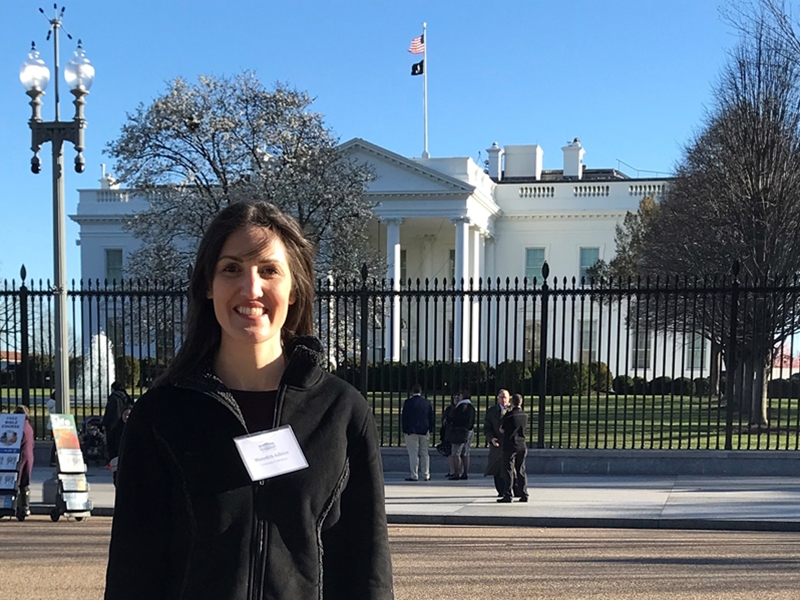Meredith Adkins, assistant research professor at the Institute for Integrative and Innovative Research (I³R), joined other climate, sustainability and resilience thought leaders from throughout the country for the White House Forum on Campus and Community-Scale Climate Change Solutions.
"We are honored that Meredith was invited to this important event at the White House," said Ranu Jung, I³R executive director and U of A associate vice chancellor for research and innovation. "The institute is committed to addressing the challenges facing our world and providing solutions that produce meaningful societal impact. Meredith exemplifies our vision with her research in sustainable community development, including her work in the FoodTech sector on technology solutions for sustainable regional food systems."
Organized by the White House Office of Science and Technology Policy, MIT and the University of Washington, the two-day forum held last month brought together U.S. government officials and experts from higher education to showcase how innovative ideas and actions can advance climate change efforts on college campuses while benefitting the surrounding communities and beyond. Discussion topics included:
- Making campuses more sustainable and resilient, including pathways to demonstrating net-zero emissions;
- Ensuring that students have the knowledge and skills to lead in the clean industries of tomorrow and to plan, deploy and maintain the climate-smart infrastructure needed;
- Providing climate information services to states, municipalities and indigenous communities; and
- Serving as proving grounds for new climate solutions and strategies to bring them into the innovation ecosystem.
Adkins attended the conference track on the development of new climate-friendly technologies or strategies and bringing them into the innovation ecosystem, including community deployment. Discussions centered around resilience and adaptation partnerships, transitions to clean energy and renewable technologies, climate resilient agriculture and ecosystems, building capacity for community-based climate research and action, and piloting commercial innovations.
"It was a privilege to visit the White House complex and engage with government officials and representatives from almost every U.S. state at this important forum on climate change innovations," Adkins shared. "My passion for the importance of sustainability pre-dates my current research role and was expressed during my decade of prior work for the University of Arkansas in corporate relations and economic development."
In her prior work, Adkins co-founded the undergraduate, and later the graduate Net Impact chapters, followed by the People, Planet, and Profit Project — a social and environmental impact business consultancy led by Net Impact MBA and interdisciplinary STEM graduate students under the Arkansas Global Changemakers initiative. Work with the Department of Finance through Arkansas Impact Investing has focused on the investment ecosystem for climate innovations.
"At the Institute, we specialize in convergence research, which is an approach to solving the most complex societal problems through deep research integration across diverse disciplines," Adkins said. "Climate change is one of the most vexing societal problems our world faces, and building the resilient infrastructure needed to mitigate and adapt to climate-related impacts necessarily requires the skillsets of many disciplines. Furthermore, it will have far-reaching effects on our global food supply. Food and nutrition security is of vital importance to integrative health, the first grand challenge the institute is tackling. The opportunity that I was given to visit the White House, and the number of government and academic connections that I developed at this forum, is incredibly valued. Post-forum research collaborations will shape my research agenda for the decade to come."
About I³R: Established in July 2020 through a five-year $195 million grant from the Walton Family Charitable Support Foundation, the Institute for Integrative and Innovative Research brings together thought leaders and change-makers to create innovative solutions to wicked problems. We discover, develop, deliver, and deploy at scale to produce meaningful societal impact that improves quality of life and promotes economic development. Learn more at i3r.uark.edu.
Topics
Contacts
Delia Garcia, director of strategic communications and engagement
Institute for Integrative and Innovative Research
479-718-3328,
Office of University Relations,
University of Arkansas
479-575-5555,
